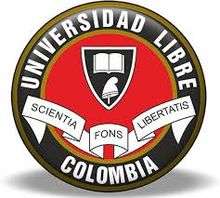Free University of Colombia
Free University of Colombia (Spanish: Universidad Libre), also called Unilibre, is a nonsectarian,[1][2] coeducational, private and nonprofit university based in Bogota, Colombia[3] with six satellite campuses located in Cali, Barranquilla, Pereira, Cartagena, Cucuta y Socorro. It is considered one of Colombia's best universities, receiving a high quality accreditation from the Ministry of Education for 4 years[4] and offers sixty-seven degree programs at the undergraduate level and one hundred sixty-three postgraduates level programs.
 | |
| Motto | "Scientia Fons Libertatis" |
|---|---|
Motto in English | Science source of freedom |
| Type | Private, Coeducational |
| Established | 1890 (as Republican University of Colombia) 1923 (as Universidad Libre) |
| President | Jorge Alarcón Niño |
| Rector | Fernando Dejanón Rodríguez |
Academic staff | 2.542 |
| Students | 37.159 (2018) |
| Undergraduates | 29.862 |
| Postgraduates | 7.297 |
| Location |
|
| Campus | Urban |
| Colors | Red and Black |
| Website | www.unilibre.edu.co |
Since the original intention of this program was to offer the space for unbiased learning during a radical political period in the country, the proper translation would be Freedom University because it promotes the liberty of expression and political thoughts.
The university is a member of the Association of Colombian Universities (ASCUN)[5] and the Iberoamerican University Network Universia.[6]
History
The Universidad Libre was established in 1890 as Universidad Republicana (Republican University of Colombia) by the Colegio Académico.[7] In 1910, Universidad Republicana went through terrible economic mishaps. A group of investors determined to save the institution led by Don Eugenio Lopez, proceeded to try to amass the necessary funds to keep the institution alive. On April 13, 1912 Universidad Republicana S.A. was constituted as a society but its commercial name was Universidad libre. In 1913 after many legal battles, Universidad Libre became an independent entity from Universidad Republicana.[8]
Now constituted as a separate entity, Universidad Libre was once again facing economic issues with many of the contributors withdrawing their funds. Cesar J. Rodriguez was in charge of the dawning task of yet again raising capital for the institution. Mr. Rodriguez hired the seasoned and charismatic leader Benjamin Herrera as head of the project. Mr Herrera was in charge of Universidad Libre until 1921 when he ran an unsuccessful presidential campaign against Pedronel Ospina. The defeated Mr Herrera finally raised the desired amount of capital in 1922 and Julio Cesar Rodriguez announced on March 29, 1922 the beginning of activities.
It was not until February 13, 1923 that Universidad Libre actually started classes, in the first faculty dedicated to Law and science.
Alumni
Libre's alumni include a vast range of prominent individuals in the history of the country and the region, with the following list representative:
- Alejandro Galvis Galvis (1891-1981), founder the newspaper Vanguardia Liberal and Minister of War.
- Dilian Francisca Toro, physician and politician.
- Domingo Esguerra Plata (1875-1965), lawyer and politician.
- Enrique Olaya Herrera (1880–1937), journalist and President of Colombia.
- German Zea (1905-1989), lawyer, politician and occupied the Ministries of Government, Justice, and Foreign Affairs.
- Gloria Stella Díaz, lawyer and politician.
- Gonzalo Correal Urrego, lawyer and scientist.
- José Fernando Bautista Quintero, lawyer and politician.
- Manuel Enríquez Rosero, lawyer and politician.
- Mauricio Pimiento, lawyer and politician.
- Rodrigo Rivera Salazar, lawyer, diplomat, professor and journalist.
- Ruth Stella Correa Palacio, lawyer and Minister of Justice and Law of Colombia.
References
- "Nonsectarian - Definition of nonsectarian by Merriam-Webster". merriam-webster.com.
- Ochoa Moreno, Benjamín. "Declaración sobre el laicismo". Retrieved 8 November 2010.
- Universidad Libre, Sala General. "Acuerdo Nro. 01 de 1994". Retrieved 8 November 2010.
- Republic of Colombia, Ministry of National Education (22 August 2016). "Por medio de la cual se otorga la acreditación institucional de alta calidad a la Universidad Libre". Autor (Resolución 16892).
- "Universidades Asociadas - Asociación Colombiana de Universidades ASCUN" (in Spanish). Retrieved December 19, 2011.
- "Universidades iberoamericanas socias de Universia" (in Spanish). Archived from the original on December 5, 2011. Retrieved December 19, 2011.
- Rueda J., Manuel Antonio (April 1890). "La Universidad Republicana". El Educacionista. Segunda (1). Bogotá: Eustacio A. Escovar. pp. 7–10. Retrieved 2017-12-13.
- Republic of Colombia, General Archive of the Nation (1913). "Escritura Pública 1182". Protocolo del año 1913. Tomo 4. pp. 421–432.CS1 maint: location (link)